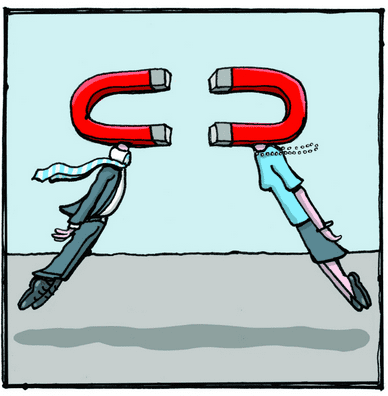Bipolar (Disorder) people must have magnets to one another, because since I met you I have met all your friends and they all have Bipolar Disorder, observes my partner. So I do a quick search of the internet:
A 2009 thread describes a similar phenomenon. In fact, most of the evidence I found was anecdotal (about 8 forums that spanned 2009-2015).
However, social psychology holds the following basic tenant:
Similarity: People also tend to pick partners who are similar to themselves in characteristics such as age, race, religion, social class, personality, education, intelligence, and attitude.
This similarity is seen not only between romantic partners but also between friends. Some researchers have suggested that similarity causes attraction. Others acknowledge that people may be more likely to have friends and partners who are similar to themselves simply because of accessibility: people are more likely to associate with people who are similar to themselves.
My psychiatrist said this is true. When you look at people in institutions, you’ll see the people with similar diagnosis sitting together, without even knowing each other’s diagnosis. http://www.psychforums.com/bipolar/topic7510.html
I currently have a roommate with Bipolar Disorder and no less than 7 friends and family with diagnoses as well. I find them normal, as I grew up with a Mother and 2 siblings with Bipolar Disorder. However, I see when there is clear pathology and confront or withdrawal from the person accordingly. For example, my roommate has been manic lately and having suicidal and homicidal ideations. I recognize the abnormality of this and gently pry about whether she has discussed these inclinations with her doctor (she has). Another, 20-something friend has relapsed in her abuse of substances: I gently encourage her to get back on the right path, send her random smiley emojis and call often.
Reality tells me that, as someone with a Bipolar Disorder diagnosis and 20 plus years of awareness of my Bipolar Disorder, I have the unique ability to help—in the most subtle and sensitive of ways—my cohorts with Bipolar Disorder. Interestingly though, my partner and I are total opposites: He is as even keel as they come, not given to mood swings or spikes and dips. He is very calmalways. Hes a different race. Hes a left brained, math and techie person and Im right brained and of the highly creative type. How does social psychology account for this?
Well, I wasnt able to find any research to support it, but I have a theory: Several of my friends with Bipolar Disorder have similar characteristics as myself and have spouses with characteristic similar to Calvin, my partners. I posit that their differentness is a calming one. Im often overstimulated by the chatter of my Bipolar Disorder friends or brought down with them by their lows, this doesnt happen with Calvin. Hes a constant. In fact, he has taught me the intrinsic value of rationality over creativity (at given times in life), of calmness instead of flared emotion, of being able to sit still and do nothing when my brain threatens to explode from my skull. His oppositeness complements me and helps me grow.
Moreover, in no way does the benefit to his differentness negate the benefits of my sameness friends. They truly get me. They understand, not simply tolerate, my mood swings. They get overstimulation, fear of too much touch, the need to reset with a nap they speak my vernacular?. Ive attended and led Bipolar Disorder support groups and find the sameness very healing. The bottom line is this: whether you have or dont have Bipolar Disorder, you have something to contribute to persons who do!
Tips for Confronting Negative/Pathological Behaviors in People with Bipolar Disorder
- Be a calming agent: Talk in soft, soothing tones, but be very direct and concise about your point/s.
- Be patient: I dont always hear things right away when Im manic or depressed. It often takes time to sink in or be processed. Frequently I apologize hours or days after being confronted.
- Consider writing/emailing your points. This shields you from potential overreactions and gives the individual time to process.
- Take suicidal and homicidal cues seriously. National Suicide Prevention Lifeline ‘1-800-273-TALK (8255)’ can help talk you through.


